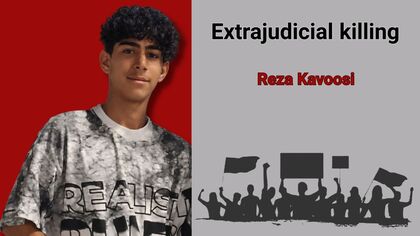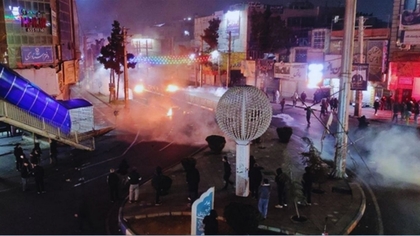Iran adopts "wait and see" policy on Syria's crisis
15:56 - 28 November 2011

Iran, its crucial anti-Israel alliance with Syrian President Bashar al-Assad at risk from an uprising against his rule, has chosen a \"wait and see\" policy driven in part by concern not to alienate anyone who might succeed him, analysts say.
A downfall of Assad could deal a strategic blow to Shi\'ite Muslim-dominated Iran, where confrontation toward Israel remains one of its overriding foreign policy principles.
Iran has used various regional cards, including fears it could unleash militant proxies like Hezbollah and Hamas against Israeli and U.S. interests, to deter foreign intervention in Syria, making it harder for protesters to overthrow Assad.
But analysts say the Iranian-Syrian axis now faces a serious dilemma: Should Iran stick with Assad -- whose family has ruled Syria for 41 years -- at any cost or should it jettison the Islamic Republic\'s most important Middle East ally?
\"Iran\'s policy is to wait and see ... We need to be patient as the situation is very unclear and very sensitive in Syria. We hope for the best possible outcome for everyone,\" said an Iranian government official, speaking on condition of anonymity.
\"(But although) Assad helped Iran play a leading role in its fight against the Zionist regime (Israel) ... now it is unwise for Iran to take sides.\"
Iran will be hard-pressed to find Arab allies to replace Syria so it will be naturally keener to ensure Assad -- whose minority Alawite sect is an offshoot of Shi\'ite Islam -- can ultimately vanquish the revolt by majority Sunni Muslims.
\"A weak Assad is no longer an effective regional ally for Iran ... But it is better to have a weak ally rather than a Sunni (Muslim) leader in power in Syria,\" said Iranian analyst Hamid Farahvashi.
However, Iranian leaders are also worried that siding too emphatically with Assad could undermine their chances of establishing a beneficial relationship with any new Syrian government, analysts say.
\"Iranians do not want to back the wrong horse ... It is a very sensitive period and any wrong move could have negative consequences,\" said Farahvashi.
There are rumors in Tehran suggesting that Iranian officials have met members of the Syrian opposition in an effort to probe the possibility of forming future alliances.
\"We do not want to be seen as betrayers of our ally ... but like all other countries, Iran\'s priority is to preserve the country\'s interests,\" said the Iranian official.
The Syrian crisis has added to pressures on Iran\'s clerical elite, ranging from tightening international sanctions imposed over Iran\'s disputed nuclear work, high inflation, long queues of jobless and investors keeping a tight hold on their purses.
Betraying frayed nerves about the possibility of government change in Syria, Tehran has called the unrest against Assad an \"American-Zionist\" conspiracy. Whether Tehran has contingency plans for any overthrow of Assad remains unclear.
\"Everything will happen behind the scenes. Iran might get closer to Lebanon\'s Hezbollah or other Shi\'ite militant groups in the region to preserve its influence in the region,\" said an Asian diplomat in Tehran, speaking on ground rules of anonymity.
The United States says Iran\'s policy toward the Syrian crisis has included financial and military aid. Iran denies any involvement in matters of the Syrian state.
Iranian officials still hope Assad will outlast the revolt. \"Assad can bring millions of his supporters into the streets ... He enjoys support of his nation in big cities as we have seen in pro-government rallies in Syria,\" the government official said.
Iranian leaders hope international efforts to unseat Assad will ultimately be undone by concerns not to ignite broader sectarian conflict between Sunni and Shi\'ite Muslims that could destabilize the wider region.
Saudi Arabia, which shares U.S. fears that Iran is covertly seeking nuclear arms, has long accused Tehran of trying stir up its Shi\'ite minority. Analysts say Syria might become the focal point of an Iranian-Saudi battle for regional dominance.
\"Syria might become a ground for America and Saudi Arabia to settle scores with Tehran ... Further pressure on Assad might cause sectarian violence in Lebanon, Iraq and many other parts of the region where Iran has influence,\" said political analyst Mansour Marvi.
With Turkey\'s condemnation of its erstwhile ally Assad over his military crackdown on protesters that has left thousands dead, Iran has become more cautious in its approach to Syria\'s crisis, condemning his use of violence and calling on his government and the opposition to reach an \"understanding.\"
Turkey and Iran are competing for influence in the new Middle East and each presents a model -- one Islamic, the other secular and democratic -- for Arab revolutionaries.
Iranian leaders view Ankara as a key cog in what they see as a U.S. scheme backed by Gulf Arab states to contain Tehran\'s ambitions to be the Middle East\'s dominant power and undermine its Islamic Revolution.
Some diplomats and analysts disagree, however.
\"More than having influence, Iran is wisely using regional conflicts, like the Palestinian-Israeli conflict, to its own benefit,\" said an Asian diplomat in Tehran. \"Americans credit Iran for their mistakes in the Middle East.\"
Iran\'s hardline rulers were quick to put a positive spin on the Arab Spring uprisings against autocratic rulers, saying it will spell the end of U.S.-backed governments in the region.
While analysts abroad have said the Arab Spring has been largely secular in nature, Iranian Supreme Leader Ayatollah Ali Khamenei has dubbed it the \"Islamic Awakening,\" saying it was inspired by Iran\'s 1979 Islamic Revolution that replaced the U.S-backed Shah with a Muslim theocracy.
The government\'s Syria policy has angered President Mahmoud Ahmadinejad\'s rivals, deepening a political rift within the conservative elite dating to the 2009 presidential election that the opposition says was rigged to secure his return to power.
Some politicians, including legislators, say Iran should side with the Syrian opposition and not \"a figure (Assad).\"
\"Iran could have mediated and controlled the crisis in Syria if Ahmadinejad\'s government had a better position in the international community,\" moderate former deputy foreign minister Mohammad Sadr was quoted as saying by some pro-reform Iranian websites.
Iran\'s reformist opposition has watched with admiration as popular revolutions have toppled several Arab dictators.
But despite divisions within Tehran conservative ruling elite, opposition leaders looks incapable for now of resuming serious street protests quelled by Revolutionary Guards two years ago in the wake of Ahmadinejad\'s re-election.
By Parisa Hafezi (Reuters)
A downfall of Assad could deal a strategic blow to Shi\'ite Muslim-dominated Iran, where confrontation toward Israel remains one of its overriding foreign policy principles.
Iran has used various regional cards, including fears it could unleash militant proxies like Hezbollah and Hamas against Israeli and U.S. interests, to deter foreign intervention in Syria, making it harder for protesters to overthrow Assad.
But analysts say the Iranian-Syrian axis now faces a serious dilemma: Should Iran stick with Assad -- whose family has ruled Syria for 41 years -- at any cost or should it jettison the Islamic Republic\'s most important Middle East ally?
\"Iran\'s policy is to wait and see ... We need to be patient as the situation is very unclear and very sensitive in Syria. We hope for the best possible outcome for everyone,\" said an Iranian government official, speaking on condition of anonymity.
\"(But although) Assad helped Iran play a leading role in its fight against the Zionist regime (Israel) ... now it is unwise for Iran to take sides.\"
Iran will be hard-pressed to find Arab allies to replace Syria so it will be naturally keener to ensure Assad -- whose minority Alawite sect is an offshoot of Shi\'ite Islam -- can ultimately vanquish the revolt by majority Sunni Muslims.
\"A weak Assad is no longer an effective regional ally for Iran ... But it is better to have a weak ally rather than a Sunni (Muslim) leader in power in Syria,\" said Iranian analyst Hamid Farahvashi.
However, Iranian leaders are also worried that siding too emphatically with Assad could undermine their chances of establishing a beneficial relationship with any new Syrian government, analysts say.
\"Iranians do not want to back the wrong horse ... It is a very sensitive period and any wrong move could have negative consequences,\" said Farahvashi.
There are rumors in Tehran suggesting that Iranian officials have met members of the Syrian opposition in an effort to probe the possibility of forming future alliances.
\"We do not want to be seen as betrayers of our ally ... but like all other countries, Iran\'s priority is to preserve the country\'s interests,\" said the Iranian official.
The Syrian crisis has added to pressures on Iran\'s clerical elite, ranging from tightening international sanctions imposed over Iran\'s disputed nuclear work, high inflation, long queues of jobless and investors keeping a tight hold on their purses.
Betraying frayed nerves about the possibility of government change in Syria, Tehran has called the unrest against Assad an \"American-Zionist\" conspiracy. Whether Tehran has contingency plans for any overthrow of Assad remains unclear.
\"Everything will happen behind the scenes. Iran might get closer to Lebanon\'s Hezbollah or other Shi\'ite militant groups in the region to preserve its influence in the region,\" said an Asian diplomat in Tehran, speaking on ground rules of anonymity.
The United States says Iran\'s policy toward the Syrian crisis has included financial and military aid. Iran denies any involvement in matters of the Syrian state.
Iranian officials still hope Assad will outlast the revolt. \"Assad can bring millions of his supporters into the streets ... He enjoys support of his nation in big cities as we have seen in pro-government rallies in Syria,\" the government official said.
Iranian leaders hope international efforts to unseat Assad will ultimately be undone by concerns not to ignite broader sectarian conflict between Sunni and Shi\'ite Muslims that could destabilize the wider region.
Saudi Arabia, which shares U.S. fears that Iran is covertly seeking nuclear arms, has long accused Tehran of trying stir up its Shi\'ite minority. Analysts say Syria might become the focal point of an Iranian-Saudi battle for regional dominance.
\"Syria might become a ground for America and Saudi Arabia to settle scores with Tehran ... Further pressure on Assad might cause sectarian violence in Lebanon, Iraq and many other parts of the region where Iran has influence,\" said political analyst Mansour Marvi.
With Turkey\'s condemnation of its erstwhile ally Assad over his military crackdown on protesters that has left thousands dead, Iran has become more cautious in its approach to Syria\'s crisis, condemning his use of violence and calling on his government and the opposition to reach an \"understanding.\"
Turkey and Iran are competing for influence in the new Middle East and each presents a model -- one Islamic, the other secular and democratic -- for Arab revolutionaries.
Iranian leaders view Ankara as a key cog in what they see as a U.S. scheme backed by Gulf Arab states to contain Tehran\'s ambitions to be the Middle East\'s dominant power and undermine its Islamic Revolution.
Some diplomats and analysts disagree, however.
\"More than having influence, Iran is wisely using regional conflicts, like the Palestinian-Israeli conflict, to its own benefit,\" said an Asian diplomat in Tehran. \"Americans credit Iran for their mistakes in the Middle East.\"
Iran\'s hardline rulers were quick to put a positive spin on the Arab Spring uprisings against autocratic rulers, saying it will spell the end of U.S.-backed governments in the region.
While analysts abroad have said the Arab Spring has been largely secular in nature, Iranian Supreme Leader Ayatollah Ali Khamenei has dubbed it the \"Islamic Awakening,\" saying it was inspired by Iran\'s 1979 Islamic Revolution that replaced the U.S-backed Shah with a Muslim theocracy.
The government\'s Syria policy has angered President Mahmoud Ahmadinejad\'s rivals, deepening a political rift within the conservative elite dating to the 2009 presidential election that the opposition says was rigged to secure his return to power.
Some politicians, including legislators, say Iran should side with the Syrian opposition and not \"a figure (Assad).\"
\"Iran could have mediated and controlled the crisis in Syria if Ahmadinejad\'s government had a better position in the international community,\" moderate former deputy foreign minister Mohammad Sadr was quoted as saying by some pro-reform Iranian websites.
Iran\'s reformist opposition has watched with admiration as popular revolutions have toppled several Arab dictators.
But despite divisions within Tehran conservative ruling elite, opposition leaders looks incapable for now of resuming serious street protests quelled by Revolutionary Guards two years ago in the wake of Ahmadinejad\'s re-election.
By Parisa Hafezi (Reuters)



